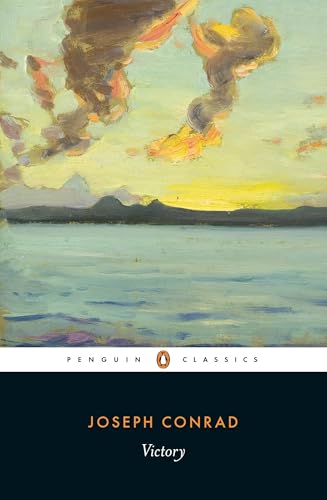Victory
An Island Tale (Penguin Classics)
Joseph Conrad
BOOK REVIEW

In Victory: An Island Tale, Joseph Conrad weaves an intricate narrative of ambition, desire, and the moral dilemmas that brew under the oppressive weight of colonialism. This riveting tale does not simply invite you to read; it ensnares you in a labyrinth of psychological tension, propelling you through the tumultuous waters of the human condition. The protagonist, Axel Heyst, embodies the fragile essence of isolation and the desperate search for redemption amidst the desolation of an unyielding world.
Set against the backdrop of an unnamed island in the Dutch East Indies, Conrad's narrative unfurls the tragic consequences of Heyst's choices. An enigmatic character, Heyst is a man burdened by solitude, having distanced himself from society's expectations and the relentless pursuit of success. Yet, beneath his seemingly detached exterior simmers a longing for connection-a yearning that draws him into a tumultuous relationship with the beautiful and enigmatic Lena. Their love story, marked by vulnerability and struggle, ignites a spark that transcends the mundane and invites us to contemplate the very nature of human existence.
Conrad's masterful prose juxtaposes the serene beauty of the tropical landscape with the inner chaos of his characters. The island serves as both a refuge and a prison, where dreams of victory clash with harsh realities. This duality mirrors the tumultuous world of the 20th century, a time when the specters of imperialism loomed large, echoing the struggles of those caught between competing desires and moral imperatives.
Readers often grapple with the complexity of Heyst's character, leading to a spectrum of opinions. Some praise Conrad's ability to evoke deep empathy while contrasting Heyst's emotional detachment against Lena's palpable vulnerability. Critics argue that this dynamic illuminates the dark corners of human relationships, exposing the inherent selfishness lurking within the quest for personal triumph. Others, however, find Heyst's passivity frustrating, yearning for a more decisive hero capable of confronting his demons head-on.
Victory is not merely a tale of individual failings; it resonates with broader themes of colonialism, gender dynamics, and existential despair. The characters navigate a world rife with moral ambiguity, where each decision pulses with the weight of consequence. Readers cannot help but confront their own biases and preconceived notions about strength, love, and the pursuit of happiness.
What elevates this novel into the realm of literary masterpiece is Conrad's ability to blend the personal with the political, making us ponder not just the nature of victory but the cost at which it comes. Victory compels us to face the uncomfortable truths masked beneath society's veneer of progress, forcing us to navigate our own victories and defeats.
In the wake of historical reflection, we are reminded of Conrad's salient influence: writers like Ernest Hemingway and F. Scott Fitzgerald drew from his well of psychological intensity and existential inquiry. The ripples of Victory continue to resonate, echoing the sentiments of those who seek to understand the paradox of human relationships amid the fallout of colonial ambitions-a commentary as relevant today as it was when first penned.
For those brave enough to delve into this nuanced exploration of the human psyche, Victory: An Island Tale offers a captivating journey that transcends mere storytelling. It's an invitation to interrogate the labyrinth of our own lives, ultimately leading us to a deeper understanding of our shared humanity. Engage with its truths, grapple with its complexities, and prepare to be transformed. Your victory over ignorance awaits. 🌊✨️
📖 Victory: An Island Tale (Penguin Classics)
✍ by Joseph Conrad
🧾 432 pages
2016
#victory #island #tale #penguin #classics #joseph #conrad #JosephConrad